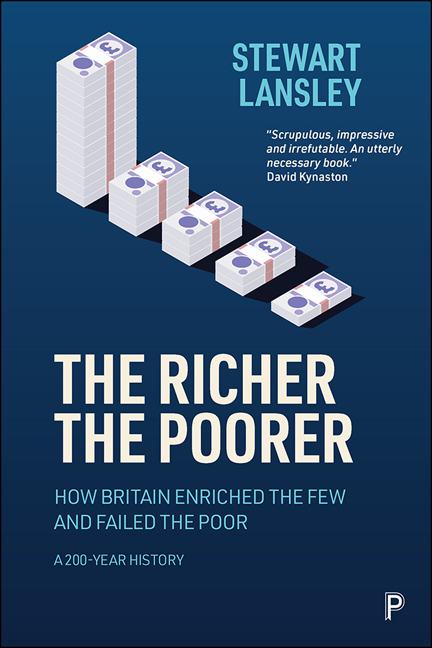Book contents
- Frontmatter
- Miscellaneous Frontmatter
- Dedication
- Epigraph
- Contents
- List of figures
- Preface and acknowledgements
- Introduction: Knighthoods for the rich, penalties for the poor
- PART I 1800–1939
- PART II 1940–59
- PART III 1960–79
- PART IV 1980–96
- PART V 1997–2010
- PART VI 2011–20
- Afterword: COVID-19 and ‘the polo season’
- Notes
- Index
22 - The good, the bad and the ugly
Published online by Cambridge University Press: 13 May 2022
- Frontmatter
- Miscellaneous Frontmatter
- Dedication
- Epigraph
- Contents
- List of figures
- Preface and acknowledgements
- Introduction: Knighthoods for the rich, penalties for the poor
- PART I 1800–1939
- PART II 1940–59
- PART III 1960–79
- PART IV 1980–96
- PART V 1997–2010
- PART VI 2011–20
- Afterword: COVID-19 and ‘the polo season’
- Notes
- Index
Summary
The pioneers of the discipline of economics had warned of the dangers of a rush to enrichment. Adam Smith spoke of the consequences of the love of quick money by ‘the prodigals’. In a modern-day equivalent, the former World Bank economist Branko Milanović has distinguished between ‘good’ and ‘bad’ inequality.
Some of the personal wealth boom of recent decades has been associated with ‘good inequality’, the product of wealth and job-creating entrepreneurial activity and innovation which harms no one and adds to the common good. ‘Bad inequality’ arises from the exercise of disproportionate and unmerited power that brings negative consequences for wider society, such as through Wilfredo Pareto's ‘appropriation of existing wealth’. Such inequality has always been a feature of capitalism, but became less prevalent in the postwar years before making a spectacular comeback. The wealth ‘megashift’ of the last thirty years is less a justified reward for promoting an innovative leap forward than a large windfall gain stemming from the new licence to get rich. The methods used for modern-day enrichment –the engineering of corporate balance sheets, growing monopolisation, the monetisation of social need, the selling off of socially-owned wealth and the overpricing of financial products, along with tax avoidance and wealth concealment –are a far cry from the culture of productive entrepreneurialism central to classical economic theory and advocated by Mrs Thatcher and Tony Blair.
From the millennium, the corporate buyout juggernaut gathered pace, with the total value of UK deals at twenty times that of the early 1980s. The multi-billion-pound deals of the time include the 1999 acquisition of Amoco by British Petroleum and the bitterly fought and titanic Vodafone takeover of Mannesmann in 2000. In 2004, Royal Dutch acquired Shell, and in 2007, a consortium led by RBS landed the $100 billion takeover of the Dutch bank ABN Amro, a deal which helped sink RBS just a year later. Such deals delivered breathtaking fees and bonuses for those involved. ‘Where are the customers’ yachts?’, runs the Wall Street adage. The investment banks masterminding the Vodafone-Mannesmann takeover earned advisory fees in excess of L400 million. The boom in buyouts helped to create giant conglomerates with the monopoly power to exert new pressure on small suppliers, and was a key driver of worsening pay and staff conditions.
- Type
- Chapter
- Information
- The Richer, the PoorerHow Britain Enriched the Few and Failed the Poor: A 200-Year History, pp. 198 - 206Publisher: Bristol University PressPrint publication year: 2021



